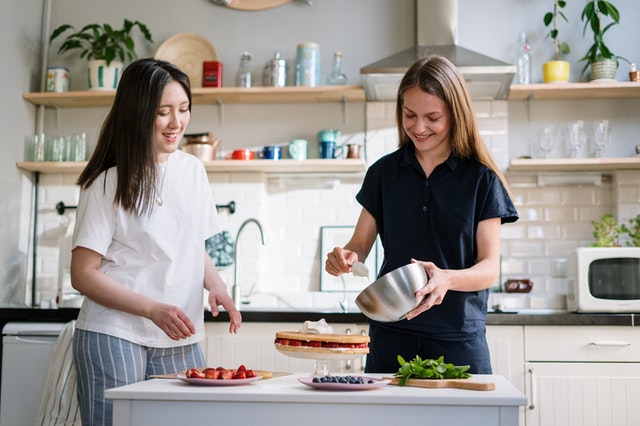14 Kitchen Hygiene and Safety Practices You Should Observe
Observing kitchen hygiene and safety measures is so pertinent. Cooking is an art and a skill, however, beyond that, it is important to ensure you take into cognizance, proper hygiene while at it. Your family should enjoy your food as well be and feel safe while eating it. Hence, you should observe these kitchen hygiene and safety measures.
Maintaining kitchen hygiene and observing safety practices helps to prevent food poisoning, fends off sicknesses and illnesses, minimizes the possibility of pest infestations and improves the overall health of your family.
Check out these kitchen hygiene and safety tips;
Keep Yourself and Your Kitchen Work Environment Clean
It is vital you keep yourself clean before you enter the kitchen, and try to do same while cooking. Also crucial is your kitchen work area; ensure that they are clean in order to prevent the infestation and spread of germs and bacteria. You should sanitize your kitchen thoroughly and regularly.

Wash Your Hands Properly Before Touching Food Items
Keep your hands clean, particularly before handling raw food items such as meat, fish and the likes. This is a vital kitchen hygiene practice that should be regularly observed, in fact, it should become a part of you.
Wear a Hairnet/Bonnet and Apron
Cover your hair properly with a bonnet or hairnet to prevent hair from entering into the food you are preparing. You don’t want those you intend serving picking up hair particles from the food, so properly cover your hair. You should also wear an apron in order to prevent your food from coming into contact with germs, dust and bacteria that may be on your clothes. Make sure your apron and hairnet are clean before putting them on.
Wear Closed-in Shoes
Wear closed-in shoes while in the kitchen as a safety measure. Closed-in shoes safeguards your feet in situations where there is a spill of hot water, oil or any breakage.
Avoid Wearing Jewelries While in the Kitchen:
Do not put on jewelries while cooking as they can be residue for germs, dirt and bacteria that can enter into your food and cause harm to your family.
Properly Trim Your Fingernails
It is important to keep your finger nails clean and short before cooking. Long nails can be a hub for dirt and germs that cause diseases and infections. So, properly trim your nails as a kitchen hygiene and safety measure.
Regularly Dispose Garbage
Dispose your kitchen garbage regularly to prevent flies and other insects from penetrating your foods which can be harmful to you and members of your household.
Keep Kitchen Equipment Clean and Easily Accessible
Ensure all kitchen equipment are clean so as to prevent the influx of germs and disease-causing bacteria, also ensure that these equipment and utensils are easily accessible.

Have Different Chopping Boards For Different Purposes
You should have a variety of chopping boards serving various purposes, this is important to prevent cross-contamination. Chopping boards used for slicing vegetables should differ from that used for dicing fruits, the one used for cutting meat or/and fish should differ from that used in slicing bread.
Store Foods Properly Before and After Cooking
Foods and food items should be stored appropriately. Food items that need to be closed should be closed, those that need to be kept open for air should be kept open. After cooking, also store your foods appropriately.
Serve Food With Utensils
Do not touch foods with your hands while serving, this is crucial so as not to introduce germs into them. So, utilize kitchen utensils in serving foods.
Use Handles of Utensils When Serving
Only hold the handles of your kitchen utensils when serving food, so that you don’t end up introducing dirt or germs from your hands into the food.

Do Not Use Aprons to Dry Your Hands
Drying hands with aprons has become a popular practice, but it is not healthy to do so. Germs can still be introduced into your hands when you dry them with aprons. Rather, use a clean, dry towel to dry your hands after washing.
Properly Cover Wounds With Waterproof Plaster
It is not advisable to cook when you have an open wound, burn or an infection, however, if you must, properly cover wounds with waterproof plaster.
Foods prepared in an healthy and safe environment tastes yummier! Observe these hygiene and safety tips next time you want to use the kitchen to keep you and your family healthy and safe. Healthy foods encompass the method of preparation too, and observing these kitchen hygiene and safety tips is a step in the right direction.

